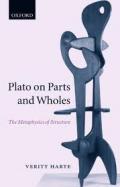Plato on Parts and Wholes

This book is an examination of Plato's treatment of the relation between a whole and its parts in a group of Plato's later works: the Theaetetus, Parmenides, Sophist, Philebus, and Timaeus. Plato's discussions of part and whole in these texts fall into two distinct groups: a problematic one in which he explores, without endorsing, a model of composition as identity; and another in which he develops an alternative to this rejected model. Each model is concerned with the nature of composition of a whole from its parts, such that a whole is an individual, rather than a mere collection or heap. According to the problematic model of composition, a whole is identical to its many parts, that is, the relation of many parts to one whole is just the relation of identity. This model is shown to have the paradoxical consequence that the same thing(s) is (or are) both one thing and many things, and for this reason, amongst others, it cannot support an adequate account of composition. According to the alternative model of composition, wholes of parts are contentful structures (or, instances of such structures), whose parts get their identity only in the context of the whole they compose. Plato presents the structure of such wholes as the proper objects of Platonic science: essentially irreducible, intelligible, and normative in character.